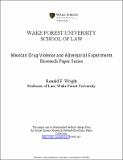|
Reseña:
|
Two remarkable developments mark this time in Mexican criminal justice as profoundly different. First, the country is suffering through wrenching violence connected with the drug trade. Second, Mexico has embarked on procedural changes both at the federal and state levels. Many characterize this procedural transformation as a shift from an inquisitorial to an adversarial model of criminal procedure. I suggest, however, that the reforms do not simply endorse the strengths of a particular adversarial fact-finding method. Rather, the codes create meaningful competition for the public prosecutors in Mexico during the investigation, trial, and punishment of alleged criminals. This essay considers the connections between these two events, both in the past and the future. Did one development cause the other, or did they both flow from a single cause? First, I consider the “inevitability hypothesis.” According to this view, procedural reform would have happened with or without the drug violence, and the fact that they occurred at the same moment is simply a coincidence. I believe the stronger account, however, is the “violence-as-causation” hypothesis. According to this account, the extraordinary drug violence of 2007 made possible a sweeping set of procedural changes. The violence was necessary to motivate actors to embrace major institutional change. |



